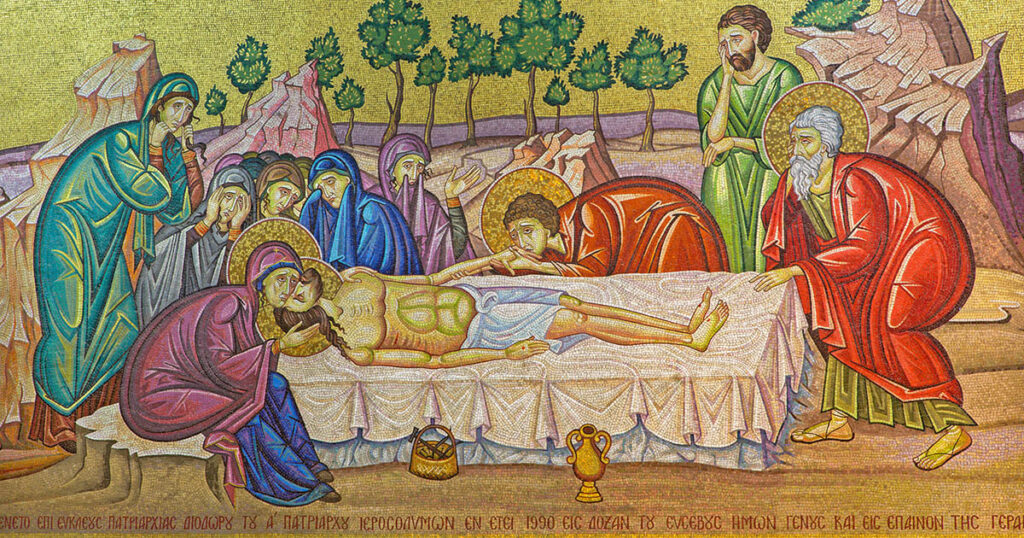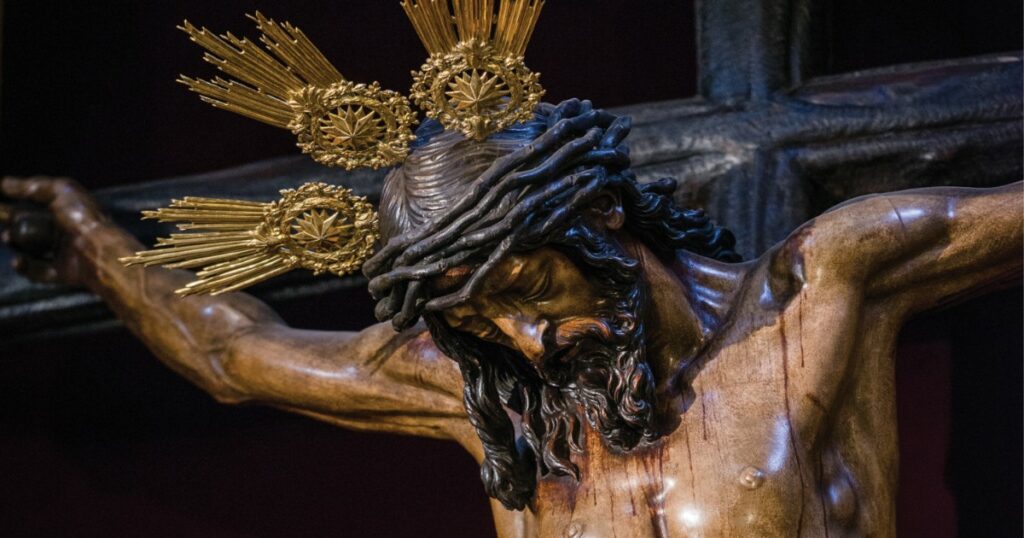Read the story of Jesus’ anointing in Matthew 26:6–13 and Mark 14:3–9.
Two days before the Passover when He would be betrayed, Jesus and His disciples reclined to eat at the house of Simon the leper in Bethany. While they were reclining, a woman came to Jesus and anointed His head with precious, fragrant ointment. Indeed, she broke the jar, and used it all.
The woman’s actions, however, offended the disciples, who complained about the waste. They thought it was bad stewardship for the woman to use all of that precious ointment, when instead she could have sold it and given the money to the poor.
This was not the first time dinner guests took offense at Jesus’ being anointed. Earlier at the house of Simon the Pharisee, when a woman who was a sinner anointed Jesus’ feet not only with precious ointment but also with her tears, the other dinner guests grumbled. On that occasion the Pharisees were critical of Jesus; now Jesus’ own disciples were critical.
John the Evangelist gives yet another account of Jesus’ anointing in Bethany, the same week before the Passover, in which he similarly recounts the criticism — especially from Judas — that the anointing was a waste of money. Whether this is the same or a different event (biblical scholars have differing opinions), it is clear that Jesus was anointed from His head to His toes.
The Christ
Jesus was anointed so many times, it is no wonder that He was called “the Christ,” which in Greek means “anointed.”
Jesus was called Christ, however, long before He was literally anointed at dinner tables, because Christ was the Greek equivalent of the Hebrew “Messiah.” John the Evangelist recounts how Andrew first called his brother Simon to see Jesus, saying, “‘We have found the Messiah’ (which means Christ)” (John 1:41).
The people were looking forward, with eager anticipation, to their anointed Messiah, who would be the Savior of Israel, who would be chosen and anointed not by men, but by God Himself. When the people wondered if John the Baptist might be the Christ, he denied it and pointed his disciples like Andrew to follow Jesus.
Jesus, however, did not deny His identity, but declared Himself the fulfilment of God’s promise, in the words of the prophecy of Isaiah 61:1: “The Spirit of the Lord is upon me, because he has anointed me to proclaim good news to the poor” (Luke 4:18).
John the Baptist witnessed how Jesus was anointed with the Holy Spirit after His Baptism in the Jordan River. And the apostle Peter likewise proclaimed, “God anointed Jesus of Nazareth with the Holy Spirit and with power” (Acts 10:38). By such testimonies Scripture proclaims the truth of Jesus’ claim to be the Christ, the true Messiah, unlike the many false “christs” who came before and after Him.
Jesus’ anointing points to both regal and prophetic responsibilities. Like King David, Jesus was “the Lord’s Anointed,” chosen by God to be the King of the Jews. Unlike David, however, Jesus the Son of David rules over the kingdom of Israel forever. Jesus came not only to rule over the kingdom of God, but also to proclaim the Gospel of salvation and entrance to His kingdom through the forgiveness of sins. This dual purpose of Jesus’ anointing is beautifully captured in His trial before Pilate. “You say that I am a king,” Jesus said. “For this purpose I was born and for this purpose I have come into the world—to bear witness to the truth. Everyone who is of the truth listens to my voice” (John 18:37).
When the woman anointed Jesus in Bethany, however, Jesus stated another purpose for the anointing of His body. Knowing that He would soon be crucified, die and be buried, Jesus explained the woman’s action with the words, “She has anointed my body beforehand for burial” (Mark 14:8).
These words would have been surprising even to the woman who anointed Him; she was expressing her devotion and love with little understanding of the prophetic significance of her actions. At that time none of the disciples understood how or why Jesus had to suffer and die to fulfill the Scriptures.
Jesus, however, always knew His Father’s will and the purpose for which He was sent into the world. He knew the title “King of the Jews” would be featured prominently at the crucifixion, where Pilate would have it written for everyone to see. He knew the promised Messiah had to be not only a king, but also a servant — a suffering servant — and a sacrificial lamb whose blood would atone for the sins of the world.
Anointed by the Holy Spirit
Understanding why Jesus was anointed helps us see the significance of our own anointing as baptized children of God. We also are anointed by God. We also receive the Holy Spirit. With Christ, we also testify to the truth. With Christ, we also reign in the kingdom of heaven. John writes, “You have been anointed by the Holy One … the anointing that you received from him abides in you” (1 John 2:20, 27).
With these words John speaks about a spiritual anointing by which Christians are united with Christ and abide in Him and His truth. About such anointing St. Paul wrote, “And it is God who establishes us with you in Christ, and has anointed us, and who has also put his seal on us and given us his Spirit in our hearts as a guarantee” (2 Cor. 1:21–22). With such words the apostle associates our divine anointing with the sacrament of Baptism.
During the rite of Baptism, Christians may receive a bodily anointing, when the forehead is anointed with oil in the sign of the cross. This bodily anointing likewise signifies our incorporation into Christ.
As Christ was not anointed for an earthly kingdom nor His body for earthly glory but for burial, so our anointing and union with Him likewise means cross and burial for us. By Baptism we are crucified and buried with Christ, and by anointing our bodies are prepared as vessels of the Holy Spirit, not for earthly glory but to be offered up to God as living sacrifices. In this life our Lord prepares us to expect not praise but rebuke, not glory but persecution, not peace like the world gives, but a sword.
As Jesus promised, this woman’s fragrant deed has been told in memory of her around the world. Indeed, the aroma of the spiritual and bodily christening of those who believe in Jesus and the fragrance of the knowledge of Christ have now reached the ends of the earth and bring great division. “For we are the aroma of Christ to God among those who are being saved and among those who are perishing, to one a fragrance from death to death, to the other a fragrance from life to life” (2 Cor. 2:15–16). Our comfort and our hope rest not on earthly things but on the knowledge that our anointing is a seal and pledge from God. We will receive the reward and the inheritance that He has prepared in His mercy and grace for all His children.
Image by Getty Images.






Joseph of Arimathea is the Patron of Saint for Funeral Directors. I believe it should be Nicodemus who brought the spices.